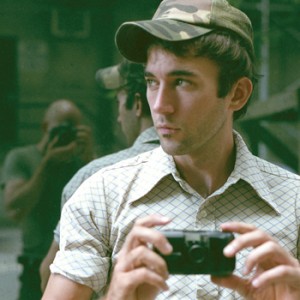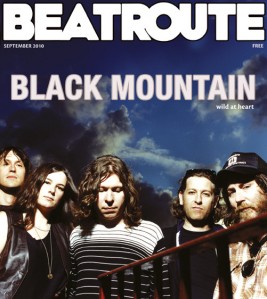Do you know how much I listened to Twin Cinema in high school? How about Streethawk: A Seduction. This was pretty cool, to say the least. Originally appeared in Beatroute Magazine.
“It feels about 10 times longer than anything else,†Dan Bejar says with no obvious hint of fatigue. For a man requiring more fingers and toes than the average person has to tally his pressed musical output, one would expect the two years invested in his latest album, Kaputt, to feel like a lifetime. Released like so many others under his ostensible solo banner, Destroyer, Kaputt is another in a string of reinventions Bejar has introduced into his many projects. Retreating from the idiosyncratic rock core that has centered his work since 2001’s standout Streethawk: A Seduction, Bejar and his collaborators are readying a jarring LP for release in 2011 that owes more to the jazz and R&B worlds than the indie rock one in which Bejar has thrived. The casual pace, Bejar says, is just part of that new sound.

“Usually, these things take a couple months max. I never work around the clock on a record, but this got off to a pretty slow start, a pretty scattered work schedule for the first while.†Interspersed with releases by the New Pornographers and Swan Lake, Bejar marshalled a long list of regular and new contributors in the seemingly endless recording process. It’s an assault on the primary myth of Destroyer as a Dan Bejar solo project, the man in question quick and liberal with his deflections of credit. “The albums are a testament to that. They don’t sound like someone sitting down with a guitar for the most part. I’m not like Prince. I’m not orchestrating these things all on my own, especially on this album, where I barely did any singing and I brought to the table just a couple melodies. My hands on a musical instrument at any time was scandalous. I was practically like a curator.â€
The album title Kaputt serves to put another bullet in the gun of those who would flippantly toss the words “literary†or “pretentious†as careless descriptors of Bejar’s songwriting style. “With Kaputt, I had this book that someone lent me. It had never really dawned on me that the letters ‘k-a-p-u-t-t’ was the word ‘kaputt’ that gets used once in a while in English or something, being kind of collapsed or over.†Written by Italian dramatist and writer Curzio Malaparte, the book title Kaputt struck a chord with Bejar. “It just looked like some strange, cool looking word…maybe because they used the German spelling. I think even when I decided that might be a cool title for a record that someone else had to point out to me what that word was. I thought it was a word in a foreign language.â€
While New Pornographers partner A.C. Newman has succumbed to Canadian musical brain drain and moved south, Bejar keeps strong ties with his hometown of Vancouver. “I’m here. I was born here. I’m a son of Vancouver. I mean, I’ve moved around a little bit but I’ve clocked a lot of time here and I mean, who’s to say I won’t move again.†He is grounded in his admiration, however. “If you’re asking me if there are a few reasons why someone shouldn’t move here, I could name a bundle, but I’m not going to get into that.â€
After living in Spain and touring heavily, Bejar is aware of the pressures of touring, while keeping a positive perspective on the base unit of a musical career. “I’m still trying to act semi-professional. Destroyer’s mantra is kinda ‘keep it semi-pro.’ I’ve failed to really hone any other bankable skill in my last 38 years of living, so you try and figure out another way of, you know, another way of living. All that talk makes it sound like I’m gonna be onstage rolling my eyes and pouting, which isn’t at all what happens. People say that I do but I don’t think that’s what I do.â€
Working once again with longtime friend and Zulu Records proprietor Nick Bragg, and again adding the producing and musical talents of John Collins and David Carswell (of JC/DC Studios fame), Bejar works hard at dispelling any auteur delusion. “It’s always key to Destroyer. There’s no record where it hasn’t been yet… I mean, Don and Dave played a huge role on this record. When I listen back to it, in a lot of ways it sounds more like Don’s record than mine (laughs). It’s not something to get glossed over.†The JC/DC partnership is a prolific one for Destroyer, and Bejar has come to value their contributions highly. Of John Collins, producer and New Pornographers compatriot, Bejar notes, “There is a certain pace that he has. A feel, which I do think comes shining through on the record. I knew that going in and that’s why I wanted him to be involved as heavily as possible from the get-go because I thought it would be a real strength.â€
Bejar attests that the recording process was almost casual, and mostly consisted of collaborating artists “coming in and blazing all over what we have and then leaving.†Odder still is the aural blinders Bejar applied to them. “I didn’t want other people to hear what the others were doing. Any kind of illusion of that is part of the mixing process, really.†The forced conclusion is that Kaputt is, then, a marvel of production, as while the process seems like that of a jam band, each track segues seamlessly into the next, each feeling more like pieces of a jigsaw puzzle than a haphazard Pollock splotch. These factors result in a new, welcome distance from the material for Bejar. “What I like about the songs on Kaputt is that I don’t know how they go for the most part. There are like two or three songs with a conventional song structure and then there are some that are just like, jams that I sing over. And then, there’s ones that are neither.â€
The first major sea change in the Destroyer sound since the artistic leap forward displayed on the 2006 critical darling Rubies, Kaputt learns as much as possible from the worlds of acid and ambient jazz. A notable addition: actual trumpets, bleeding in and out of the background, waxing from mournful to playful in a heartbeat, all Red Shoe Diaries without the sleaze. “I don’t think there’s ever been trumpet on a Destroyer record besides from the fake bullshit that you can hear on Your Blues.†Realized indoors on GarageBand and perfected in the studio with actual players, the shift is impossible not to notice but is absent the mid-career bloat endemic with similar movements. Fans can breathe easy, as Kaputt packs on the extra instrumentation with poise, more Pet Sounds than The Soft Parade. Early album standout “Blue Eyes†walks softly with crushing vocals, “A Song For America†threatens stationary hips everywhere and a possible incongruity with rare lyrical collaborator Kara Walker forms a prime centerpiece for the ambitious LP.
Through a collaboration on a Merge box set, visual artist Kara Walker discovered Bejar and the Destroyer back catalogue and set in motion a peculiar partnership. Known as a formidable lyricist, one could imagine that the most presumptuous of pitches to Bejar would be lyrics. Walker took the chance, and the resulting product forms the basis of “Suicide Demos for Kara Walker.†With a moody, ambient introduction giving way to evocative poetry, her fingerprints are as obvious as the modifications Bejar made and the JC/DC production value. Begun as a series of rough demos, the song title became less aspirational, transforming into what Bejar calls “maybe an educational video on how Kara Walker could kill herself.†The smooth vocals are a significant distance away from the wailing on “Jackie Dressed In Cobras†and bears only passing similarity to the intentions peppering Streethawk through Trouble In Dreams but are somehow unmistakably Destroyer. That is, channeling Pet Shop Boys in a world where synth is illegal. Walker’s impressions were positive. “She’s heard it. She gave me the go ahead. She says she liked it, which is cool because I want her to like it.â€
Kaputt also marks another in a series of collaborations serving as the professional end of a long friendship. Nick Bragg and Bejar have been friends for roughly two decades, and Bragg’s role as the de facto lead guitarist of Destroyer is seemingly both a minor and major part of that relationship. “It’s like a little blip of time compared to the amount of normal time we spend. He’s kinda played lead guitar in Destroyer for like nine years or something. It’s not like I go to him…there’s not a lot of dialogue. I’m basically like, ‘Go home and shred all over this stuff and if you feel like it, come into the studio and do some more.’†In the same way as with his other collaborators, Bejar is again quick to deflect much of his praise to Bragg. “His playing has real fangs, and a lot of this is based around softer sounds and textures. I wasn’t sure if he would be into it, if it would be his cup of tea. I find most of the cathartic moments on the record come from his playing.†Bragg is similarly vocal about their relationship, both in and out of the studio. He remarks that Bejar is “more of a friend than a musician to me†and that he derives great pleasure from watching his friend grow in that respect. “People talk about how stylistically or sonically, concepts he’s playing with have changed over the years but I just look at it how he’s continued a series of ideas and kept refining them to the point where they are now.†For Bragg, however, the huge shift in concept and tone on Kaputt is something he welcomes from Bejar and Destroyer. “When you boil it all down, it still becomes essentially a Destroyer record. No one would expect him to make a record of quiet storm, late-night R&B songs. I don’t know if it’s the record he wanted to make. No record ever really ends up exactly where you want it and that’s probably part of the fun.â€
While Kaputt instantly eliminates any accusations of sloth or inattention to detail that the word “casual†may impart, one could posit that of a recording process that shares more in common with an impromptu Super Bowl potluck. Along with the oddly final album title, one wonders if these are the last days for Destroyer. Bejar figures there is really no metric for when it’s time to quit. “I’ve never tried to write a song. I don’t know if I know how to go about trying. I don’t think it means that once you have to start trying, it’s as simple as you should stop or quit. There is a whole school of songwriters that I really admire where tedious craft is part of what they do. It would probably be good for me to have like, some kind of ethic like that, like a work ethic like that. Toil instead of just rooting over weird things in my brain.†It’s a sentiment he explores on “Blue Eyes,†singing loudly “I write poetry for myself/I write poetry for myself.â€
Still, retirement is something he cannot immediately reconcile. “I haven’t really thought of all this kind of Jay-Z retirement stuff. Yeah, I definitely wouldn’t feel like naming (Kaputt) something as ironed out as that.†The action intrigues Bejar, however. â€I have no beef with that whatsoever. I love people who retire in general. I always find it really admirable rather than just punching the card for the rest…†Bejar trails off.
“Punching the card, is that the expression?â€







